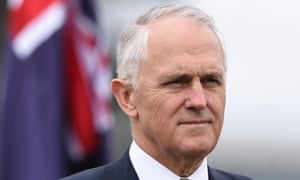Extract from The Guardian
The prime minister is impatient for Australia to
be right in the thick of the clean energy race, but the policy he has
inherited and the mentality of some of his party force him to trot
out tired ‘energy poverty’ lines
Malcolm Turnbull: ‘You have to remember that
energy poverty is one of the big limits on global development.’
Photograph: Lukas Coch/AAP
Contact author
Tuesday 27 October 2015 12.02 AEDT
Malcolm
Turnbull needs all his rhetorical skill to bridge the gap between
what he knows is true and what he has to say to appease his party.
Asked about the future of Australian coal exports
on Tuesday, Turnbull started with the familiar “energy poverty”
argument. This line has previously
starred in Peabody Energy’s global pro-coal campaign, was
recited by Turnbull’s resources minister Josh Frydenberg when the
government reapproved Adani’s proposed $16bn Carmichael mine and
the minister explained there
was a “strong moral case” for new mines and was expounded in
even more black and white terms by the former prime minister Tony
Abbott, who
told the nation coal was “good for humanity”.
Turnbull put it this way: “You have to remember
that energy poverty is one of the big limits on global development in
terms of achieving all of the development goals, alleviating hunger
and promoting prosperity right around the world – energy is an
absolute critical ingredient. So coal will play a big part in that.”
But within minutes Turnbull was also explaining
the facts that undermine that argument – that almost half those in
“energy poverty” in India
have no access to the electricity grid and that “in a remote
community, or ... in a developing country where there is no
electricity grid, and the alternative is generating power by burning
diesel, then solar panels and some batteries ... often will be more
cost-effective”.
As India’s former energy secretary EAS Sarma
wrote
in the Guardian recently, the expansion of India’s coal-fired
generation since 2001 did not expand access to energy, but was taken
up by those industries and customers already on the grid.
Asked to explain, Turnbull said India needed both
– coal-fired power for its industrialisation and other forms of
energy, such as solar, in rural areas. And in the foreseeable future
that is probably true, but it isn’t the picture painted by the
industry when it argues that only coal can solve “energy poverty”
with pictures of poor rural children sitting beside a smoky,
dung-fired cookstove.
Similarly, Turnbull had to do a rhetorical dance
around the call for a global moratorium on new coalmines, choosing to
assert (incorrectly) that the argument was for an Australia-only
moratorium and explaining that there were many other producers of
coal, including China itself, which was about to become a net coal
exporter.
But that is part of the argument used by
campaigners, and by
Turnbull’s own agriculture minister, Barnaby Joyce, to raise
questions about the proposed Chinese-owned $1.2bn Shenhua Watermark
mine on the Liverpool plains – that its business case no longer
stacks up and its exports are no longer needed.
Turnbull fully understands the massive
technological change afoot in the energy sector, he understands
climate science, and he is impatient for Australia to be right in the
thick of the clean energy race.
But he is constrained by the policy he has
inherited and the mentality of some in his party.
And so he sends signals, like saying that no
energy source can have a “moral characteristic” and that
Australia just has to make rational choices between the various
abundant energy sources it has available.
That sounds good. It just remains unclear whether
his government can do it.

No comments:
Post a Comment